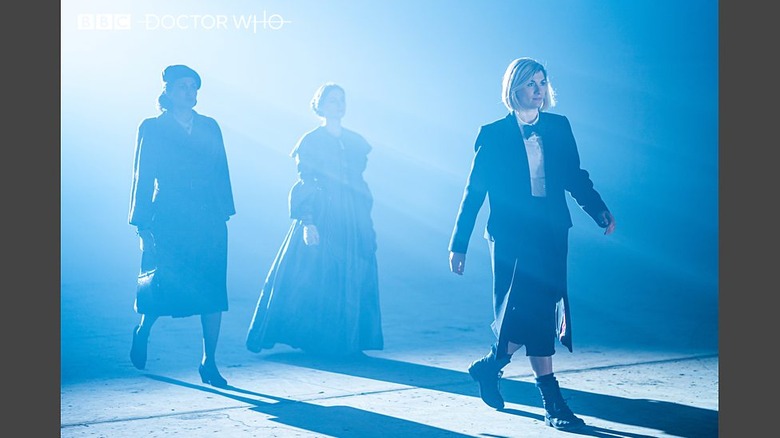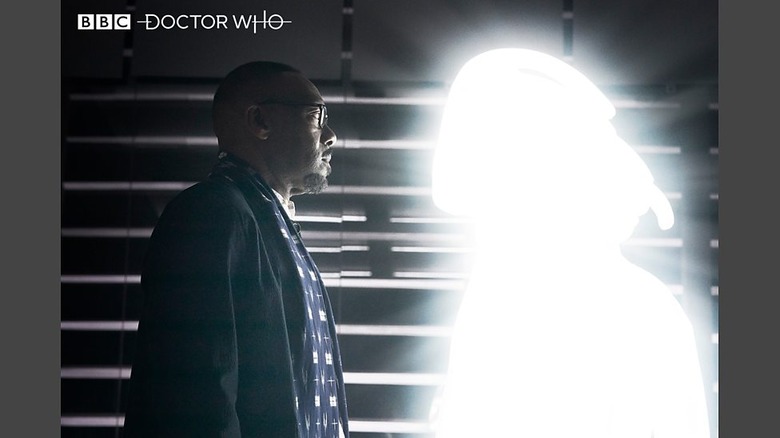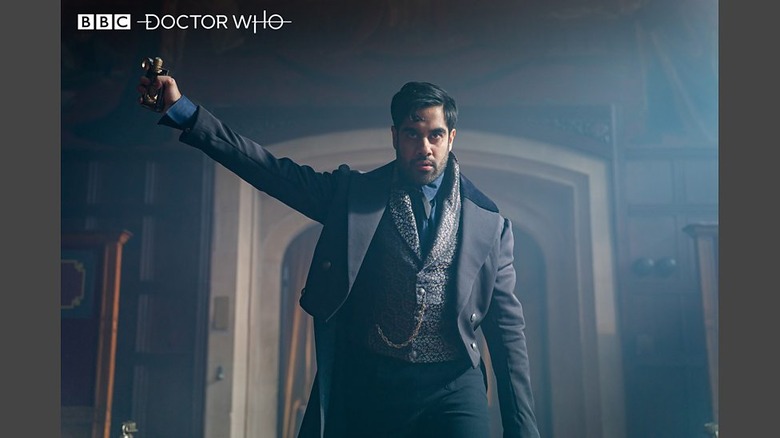With "Spyfall, Part 2", 'Doctor Who' Aims A Laser Shoe At The Past While Looking To The Future
Doctor Who has never been one to stick to canon, or even really pay attention to continuity. The Doctor's biggest villains, from the Daleks, to the Cyberman, to yes, even the Master, will return with little to no explanation after seemingly permanent deaths, and the Doctor's home planet of Gallifrey is all-important until it's not. When you boil down this show, it's just a lovely sci-fi adventure about a time-traveling alien who goes on adventures through time and space with human companions. Which, at a basic level, "Spyfall, Part 2" succeeds at.Jodie Whittaker's debut season last year consisted of showrunner Chris Chibnall and his writers tiptoeing around anything potentially controversial with the show's first female Doctor, resulting in one of the blandest and least memorable seasons of Doctor Who to date. But in the season 12 premiere two-parter, it seems that Chibnall and co. have gotten over their hang-ups over what to avoid, and finally started thinking about what to do with this new Doctor and her unique persona. The result: a zippy, time-hopping episode with moments of contemplative emotion that pays tribute to Classic Doctor Who while attempting to forge ahead with new season-long mysteries. While I'm relieved that we have a season-long arc again (as messy as Doctor Who's arcs could be, I enjoy the unifying storylines), I dislike that Chibnall has to burn down all the work that Russell T. Davies and Steven Moffat have done up until now. Justice for Missy!
Into the Unknown
"Spyfall, Part 2" is possibly the best episode for Jodie Whittaker to date, all because it forces her to be on her own (at least for a little bit). Right when she was introduced she was surrounded by her companions — literally crash-landing on them in her debut episode. Whittaker's Doctor is constantly chattering to anyone who will listen, but left to her own devices, what will she do? Talk to herself, of course. I like this air of vulnerability from the Doctor, as she tries to calm herself down after being sent to the other dimension by the Master. While I'm still not sure that the series has exactly nailed down the Doctor's personality yet, Whittaker does seem to have a renewed zest for the character, and more of a persona than "constantly beleaguered alien."
But the Doctor doesn't spend too much more time alone, stumbling into a woman dressed in Victorian clothes named Ada (Sylvie Briggs). Ada believes herself to be paralyzed and trapped within her own mind, until a glowing figure appears to transport her back to her body. The Doctor is at first frightened at the sight but follows the beckoning Ada, leading both of them to wake up in 19th century England, in the middle of the Royal Adelaide Gallery of Practical Science. It turns out that Ada is in fact Ada Lovelace, an English mathematician best known for her work Charles Babbage's Analytical Engine, the forerunner to the computer.
The Chibnall era has dabbled with real-life historical figures before, but its treatment of figures like Rosa Parks have been near-reverent to the point that the Doctor felt like a witness to their story rather than an active participant, but here, we get to see Ada become a full-blown companion. And it's tons of fun. Briggs is shrewd and quick-thinking as Ada — she has shades of former Doctor Who companions like Clara Oswald while retaining that restrained Victorian manner. With Ada's help, the Doctor fends off the Master, who has discovered the Doctor's reappearance in Victorian England and storms the Adelaide Gallery with murder on his mind and scenery in his teeth (Sacha Dhawan is by far the most maniacal and unhinged of the NuWho Masters yet). With Ada's help, the Doctor discovers that the alien spies, called the Kasaavin, have been embedded throughout human history. She uses the portal that had been targeting Ada to attempt to find a way back to her time, but Ada follows her and they wind up in German-occupied Paris in World War II.
On the Run
Meanwhile, Ryan, Yaz, and Graham, having escaped from the falling plane via the Doctor's time-travel shenanigans, decide to stake out Barton's upcoming keynote speech — but soon find themselves to be labeled as fugitives. Forced to go on the run, they ponder the Doctor's past with the Master and all that she hasn't told them. Team TARDIS don't have much to do this episode, to be honest, with most of their plotline consisting of them being on the run while goofing around with Graham's laser shoes (which to be fair, is a fun bit of practical comedy). Even their standoffs with Barton seem incidental to the Doctor's time-hopping adventure and her close escapes with the master. Both Ryan and Graham seem rather blasé to being labeled as fugitives, but I do like the fuller characterization of Yaz as a sort of new-gen Martha, complete with a doddering family that she constantly worries over.
As Ryan, Yaz, and Graham evade the armies of the Kasaavin and Barton's agents in a leftover thread of last episode's spy adventure shenanigans, the Doctor is having a very Doctor Who adventure, picking up another companion in the form of Noor Inayat Khan (Aurora Marion), the second historical figure of this episode. A World War II radio operator and British spy, Noor Khan takes the Doctor and Ada into her house to hide from Nazi patrols, led of course, by the Master. Doctor Who has been criticized before for the sometimes glib way it approaches historical events, while Chibnall's era took an almost too-reverent approach. But the series is at its best when its characters are unexpectedly confronted with the horrors of the future, or in the hope of a better one. We get that with Ada Lovelace's horror at seeing a burning Paris — something that will be reflected later in the Doctor's return to Gallifrey at the end of the episode. "These are the dark times. But they don't sustain. Darkness never sustains even though it feels like it might," the Doctor says to both Ada and Noor, in a line that is destined for the Doctor Who quotes book.
The Timeless Child and the Regret-less Master
Whittaker and Dhawan have a great push-pull dynamic, though I hesitate to say whether they have actual chemistry that befits the long-running relationship between the Doctor and the Master. Speaking of that long-running relationship, what the hell, Chibnall?! I was expecting some sort of explanation or at least a nod to the development that the Master underwent during the Missy arc (played with brilliant and tragic nuance by Michelle Gomez), by far one of my favorite things the show has done in recent years. But nada. I know that fans are desperately scrambling for theories that Dhawan's Master actually comes from a different point in his timeline and hasn't yet undergone the redemption of Missy's character, and I've seen explanations that the Master always turns up out of the blue and back to his chaotic ways. I do love the detail that the Master only sows so much chaos and destruction to get the Doctor's attention, but still. I'm upset that this complete disregard for the canon established by both Moffat and Davies is being completely ignored by Chibnall. But what could I expect from the showrunner who is eager to make callbacks to classic Who while happily ignoring most of what took place with NuWho?
Speaking of ignoring NuWho, let's talk about Gallifrey. After Davies boldly destroyed the Doctor's home planet at the beginning of the 2005 revival, and Moffat brought it back again with his usual frustrating timey-wimey hijinks, Chibnall has gone and burned Gallifrey to the ground. I'm not too gutted at this destruction — Gallifrey has rarely been relevant until the writers want it to be — but it does give us so much potential for Whittaker to expand beyond her wide-eyed performance. Her broken and dead-eyed reaction to seeing Gallifrey burning after the Master destroyed it is stunning, as is her brushing off of her companions' concerns at her being so quiet. The reintroduction of the "timeless child" is an intriguing season-long arc that has been building since last season, even if its premise of being related to something "built deep" in the Master and Doctor's memories, once again flouts all the canon from recent Doctor Who seasons. But despite my qualms with Chibnall's increasing determination to wipe the slate clean and start anew, this was a promising and energetic premiere for season 12 that actually hints at a return to the cheesy, silly, heartwrenching Doctor Who we know and love.



